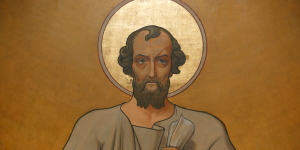Help Aleteia continue its mission by making a tax-deductible donation. In this way, Aleteia's future will be yours as well.
*Your donation is tax deductible!
St. Faustina Kowalska, a Polish nun who lived during the 1930s, reportedly had private revelations from Jesus Christ himself.
The visions she had would later be defined as the "Divine Mercy" devotion, and inspired St. John Paul II to establish "Divine Mercy Sunday" on the 2nd Sunday after Easter.
Her liturgical memorial is on October 5, and the Church chose a passage from her Diary for the Office of Readings that highlights her desire that the entire world would know of God's mercy.
Pleading for mercy
She explains in a prayer to God how she would do anything to spread knowledge of God's mercy around the worldL
O my God, I am conscious of my mission in the Holy Church. It is my constant endeavour to plead for mercy for the world...O God, how I desire that souls come to know you and to see that you have created them because of your unfathomable love. O my Creator and Lord, I feel that I am going to remove the veil of heaven so that earth will not doubt your goodness.
St. Faustina deeply desired to spread the Divine Mercy devotion to the four corners of the earth and even offered herself as a sacrifice in union with Jesus' sacrifice on the cross:
I unite myself closely with Jesus and stand before him as an atoning sacrifice on behalf of the world. God will refuse me nothing when I entreat him with the voice of his Son. My sacrifice is nothing in itself, but when I join it to the sacrifice of Jesus Christ, it becomes all-powerful and has the power to appease divine wrath. God loves us in his Son; the painful Passion of the Son of God constantly turns aside the wrath of God.
She felt it was her mission and duty to become a sacrificial offering to God and to always plead for his mercy to be known:
Make of me, Jesus, a pure and agreeable offering before the face of your Father. Jesus, transform me, miserable and sinful as I am, into your own self (for you can do all things), and give me to your eternal Father. I want to become a sacrificial host before you, but an ordinary wafer to people. I want the fragrance of my sacrifice to be known to you alone. O eternal God, an unquenchable fire of supplication for your mercy burns within me. I know and understand that this is my task, here and in eternity. You yourself have told me to speak about this great mercy and about your goodness.
St. Faustina's message is a powerful one, reminding us of God's infinite mercy and how he desires that all may return to him in the depths of their hearts.










